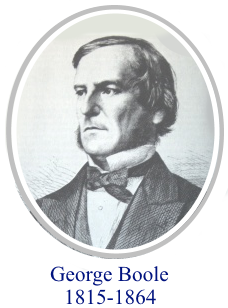
|
  The George Boole Foundation was established in 2010 in order to create an operational institution with a name to commemorate the contribution of English logician, George Boole to the world through his development of Boolean Logic, the mathematical logic used in decision analysis and to optimize the design of integrated circuits, computer programs and communications systems, including the Internet. The George Boole Foundation was established in 2010 in order to create an operational institution with a name to commemorate the contribution of English logician, George Boole to the world through his development of Boolean Logic, the mathematical logic used in decision analysis and to optimize the design of integrated circuits, computer programs and communications systems, including the Internet.
The Foundation is a spin off from the SEEL-Systems Engineering Economics Lab established in 1983 by Hector McNeill. SEEL's objective was to monitor the evolving technologies and applications making use of an advancing global network in the form of the ARPANET which was formally decommissioned in 1990 and replaced by the Internet and finally transformed into the World Wide Web in 1994 making use of the combination of URLs, HTML and the HTTP protocol, developed by Tim Berners-Lee. In 1985 SEEL purchased the documented research output of the Stanford Research Institute Decision Analysis Group upon which to establish is own decision analysis systems research and development.
When the Foundation was registered, SEEL became the division of the Foundation, responsible for all advanced design and development work in decision analysis and cloud applications. The Foundation develops applications to assist people in different sectors develop sustainable investment projects.
Since 2015 this work expanded to include solutions to growing gaps in the international project portfolio for the Sustainable Development Goals (SDGs) which continue to grow. We are committed to helping raise the performance of the SDG project portfolios in low income countries.
The main vehicle for services delivery is the SDGToolkit. This was developed during the period 2010 and 2020 as a due diligence project design procedure supported by a collection of analytical tools delivered as Software-as-a-Service (SaaS) provision. This was developed to avoid an ongoing level of project failures running at around 35% of funded projects and representing an annual loss of around $75 billion. In the quest to provide high quality services, the Foundation has emphasized the development of quality standards of evidence upon which to base better project design to achieve efficiency, effectiveness and sustainability impact.
Through the Sustainable Development Facility the Foundation will extend the reach of this service by providing grants to lower the service charges to teams concerned with policy, multiproject initiatives, executing agencies and extension services in low income countries.
The launch of the United Nations Agenda 2030's Sustainable Development Goals in 2015, increased the need for additional analytical tools. This is because the 2019 Sustainable Development Report found that income disparity continues to increase, production sustainability continues to decline and global temperatures continue to rise.
|
|
|










